Besides the dancing, what was the Prime Minister actually doing in Africa?

Theresa May’s peculiar swaying motions – what amounted to dancing, marked an awkward late-arrival of the United Kingdom to an African party which is quickly becoming rowdy. It is a party that the UK definitely does not want to miss out on, especially with the need to seek trade relations outside of the European Union intensifies, amidst potential economic depression as Brexit looms.
No one appreciates a late-comer with little to offer. But what’s worse is the United Kingdom appears to be hurrying to broker a deal that one could call a ‘rebound relationship’, as a bitter divorce with the European Union looms.
‘Her South Africa speech was ironic, to say the least. She reeled off grand platitudes of multilateral co-operation whilst the tumult of a European Union exit raged on at home.’
Theresa May recently set out on what was an already fraught mission to re-define Britain’s aged relationship with the continent during her three-day tour of its biggest hitters – South Africa, Nigeria, and Kenya. In doing so, the Prime Minister became the first British PM to visit Sub-Saharan Africa since 2011 and the first to visit Kenya for over 30 years.
Her South Africa speech was ironic, to say the least. She reeled off grand platitudes of multilateral co-operation whilst the tumult of a European Union exit raged on at home. Along with further support for counter-terrorism and the fight against human trafficking, the Prime Minister confirmed plans to carry over the European Union’s Partnership Agreement with the Southern African Customs Union and Mozambique post-Brexit, as well as plans to invest £3.5 billion in African nations over the next four years.
This stream of investment is set to be channeled through the UK governments development finance institution, the CDC Group, which was once the Colonial Development Corporation before it was the ‘Commonwealth Development Corporation’ – a transition which in itself neatly sums up the tense background of the UK-Africa relationship.
‘None should be fooled as to what this Africa tour really means for the United Kingdom. A fall-back plan, a mere extension of a broader post-Brexit strategy.’
All this was encapsulated by an ambition to have the UK “be the G7’s number one investor in Africa” by 2022 – an ambition, if fellow members of the G7 (France, Japan, and Germany) – who have already started making their incursions into the continent – can help it, will be nothing more than an ambition.
Chief among them, President Macron, is well into his own charm offensive on the continent. Having already visited eight African countries since he assumed the office. This hasn’t been without its own hiccups either, as the haughtiness of the old colonial françafrique has proven itself tenacious even with Macron’s own view of Africa, as having ‘civilizational’ problems.
More than just being a rather awkward charm offensive, Mrs. May’s attempt to woo the African nations into a ‘Partnership for Opportunity’ to tackle the 21st century’s pic-a-mix of trans-national challenges comes at a curious time. It is one of political and economic uncertainty but most importantly, a time where such partnership is perfectly expedient for a nation nervously inching toward the edge of a political cliff-top, whose decline no one can predict – and there is sure to be a decline. What is really nothing more than a desperate scrambling for stronger trade relations in the near future exposes a view of the continent as simply a place for opportunity.
The Prime Minister didn’t try to feign altruism. However, she did admit that “there is an element of self-interest in what I’m proposing” – a relief from the usual Western obfuscation and lack of transparency when it comes to their relations with the nations of the Global South. However, this offers no respite for a pitiful attempt to further engage the continent beyond Brexit.
Brexit has without a doubt left a stink, a pungent one for that matter, and none should be fooled as to what this Africa tour really means for the United Kingdom. A fall-back plan, a mere extension of a broader post-Brexit strategy. The Prime Minister did well to front a smooth sanguinity, but it falls short in deceiving.
But this all begs the question, would these grand development and security challenges that have spawned the UK’s ‘Partnership for Opportunity’ have been as pressing were there no Brexit scare about? Having studied the situation, the answer seems to be no.
SILAS OJO, BC DEVELOPMENT STUDIES




